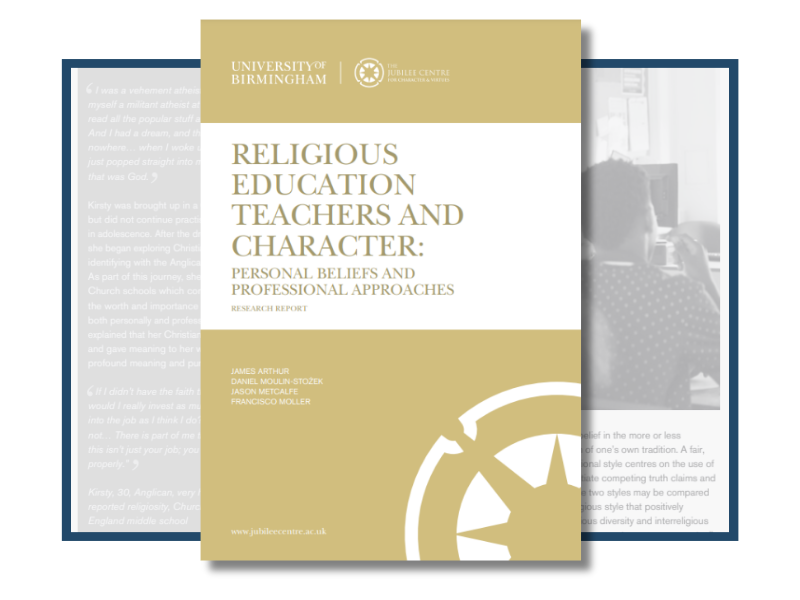Project Overview
On the 18th November 2019, the Jubilee Centre published Religious Education Teachers and Character: Personal Beliefs and Professional Approaches. The aim of the research was to explore Religious Education (RE) teacher’s worldviews and their approaches to promoting pupils’ character growth in RE.
The first, qualitative phase of the study was inspired by the narrative identity paradigm and used semi-structured interviews to explore participants’ self-understandings of the development of the course of their lives and included questions about teachers’ perspectives on RE and character development.
The second, quantitative phase, drew on initial analyses of the interviews and employed measures of religious practice and style and explored relationships between RE teachers’ worldviews, their perspectives on character education and their professional motivations.

Summary of Key Findings
- Personal worldviews informed RE teachers’ approaches in the classroom.
- RE teachers were found to have fair and tolerant views of other religions and worldviews.
- There was strong agreement among teachers with a religious faith that RE contributes to character education, and RE teachers should act as role models for their pupils.
- RE teachers that have a religious faith were more likely to think religions promote good character.
Summary of Key Recommendations
The findings of this study confirm the importance of teachers’ personal beliefs and experiences to their professional lives. It is proposed that more opportunities be made available for RE teachers to further reflect on their own worldviews and consider the implications of their personal views for practice. Professional literature and guidelines about RE could be revised to sensitively advise teachers on the best ways to incorporate their own commitments and orientations in their approach to religions in the classroom; these should acknowledge the diversity of teachers’ personal worldviews.
Given the widely held belief found among participants regarding the contribution of RE to pupils’ character development, this report provides evidence to suggest that schools
and LEAs should develop coherent rationales and syllabi for RE lessons to create further opportunities for developing character. This would strengthen the provision that RE can
make in schools, and also help cultivate the character growth of pupils of all faiths and those of none, through RE
Publications
- Moulin-Stożek, D. & Metcalfe, J. (2018) ‘Mapping the moral assumptions of multi-faith religious education’, British Journal of Religious Education, [Online].
- Moulin-Stożek, D. & Metcalfe, J. (2019) ‘The contribution of religious education to pupils’ character development’ Jubilee Centre Insight Series. Birmingham: University of Birmingham [Online].
- Metcalfe, J. (2019) ‘To What Extent Can Religious Education Help Shape Pupils’ Practical Wisdom?’. Jubilee Centre Insight Series. Birmingham: University of Birmingham [Online].
- Metcalfe, J. (2019) ‘Research Briefing: Religious Education Teachers and Character’ Jubilee Centre, Birmingham: University of Birmingham [Online]

